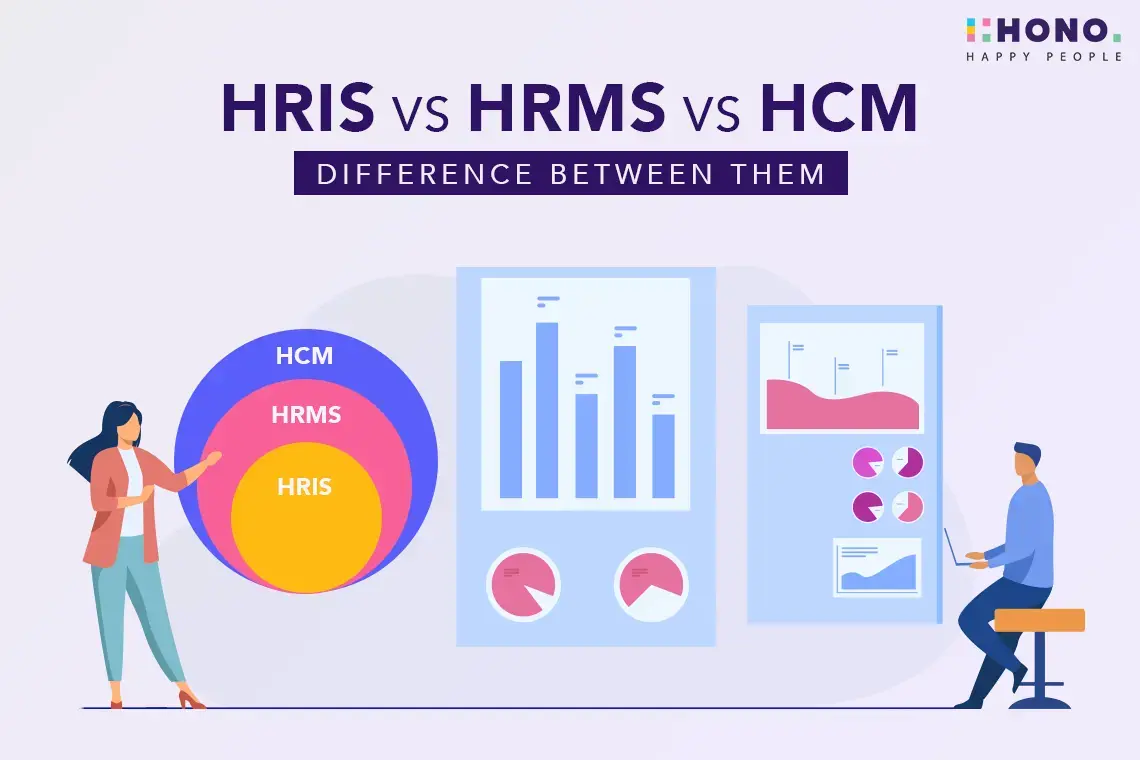What is HRIS?
A human resource information system (HRIS) is a HR software serving the purpose of storing, analysing and managing employee data for core HR functions. It can be considered as a centralized database that help with multiple HR processes in running smoothly with better accuracy and relatively lesser time.
What is HCM?
Human capital management (HCM) caters to HR practices and technology like digital solutions which helps in the functioning of HR practices. An HCM software can be classified as a cloud-based HR solution that provides a powerful suite to help the organizations bridge the loopholes or holdbacks between HR initiatives and the end business goals of any organization.
Read Here: Top 10 Human Capital Management Software in India
What is HRMS?
Human resource management system (HRMS) is a platform or technology that helps businesses to run multiple HR functions through a single platform. HRMS helps in integrating the required HR tools and enable companies to perform regular HR operations conveniently.
Read Here: 5 Best HRMS Software in India
How are HRIS, HRMS, and HCM Software Different?
In simple terms, HRIS is all about data management, HRMS is dedicated to data and basic operational tools management and HCM is a combination of strategy, operations and analytical HR management. Highlighted below are the characteristics of each term along with the difference-
HRIS
- It focuses on storing and managing employee data including personal details, work history, benefits associated and the payroll.
- Maintains employee records and adheres to compliance, taking care of the core data management system.
- HR operations rely largely on HRIS as it can be considered as a core part of employee and organizational information.
HRMS
- It is a broader system that includes HRIS capabilities with the features like talent management, performance tracking and employee trainings etc.
- Fully equipped with the workflow automation tools for employee lifecycle management.
- It also includes the payroll processing modules such as leave and attendance management, administrative activities etc.
Read Here: What Is HRMS Software? Everything You Need to Know in 2025
HCM
- This is the most versatile function of the HR operations, which also combines functions of HRIS and HRMS.
- It’s not just the regular admin tasks but goes beyond and provide strategic HR functions such as employee engagement activities, analytics, succession planning etc.
- It is also used for organizational growth, strategy and overall development.
|
HRIS
|
HRMS
|
HCM
|
|
Payroll
|
HRIS Capabilities
|
HRMS Capabilities
|
|
Tax Compliance
|
Performance Management
|
Scheduling
|
|
Benefits Administration
|
Succession Planning
|
Applicant Tracking
|
|
Time & Attendance
|
Recruiting
|
Training
|
|
Personnel Tracking
|
Onboarding
|
Budget Planning
|
|
Reporting
|
Analytics
|
Absence Management
|
|
Employee Self-Service Options
|
|
|
Read Here: 5 Ways HCM Software Can Transform Employee Experience
HRIS, HCM and HRMS Similarities
All three terms might have different scope of work, different work to perform and maybe helpful at different facets of the organization and employee lifecycle but the biggest similarity between these three is that they are all served for improving HR operations.
- They help in digitizing the HR management and automate the regular HR tasks, making the entire process quick, efficient and paperless.
- All three software help in storing records, data and information which is sensitive for the organization.
- They help in making regular reports based on data and analytics.
- They are easily integrable with HR modules such as payroll, attendance, finance etc., promoting better HR functions.
How Do You Choose Between HRIS, HRMS, and HCM Solutions?
Choosing between HRIS, HRMS and HCM solutions mostly depends on your organization’s long terms strategy and goals. Here are some quick pointers to get you started-
- Determine your organizational needs. For instance, if your organization require to digitize employee records and manage payroll, HRIS could be the right choice.
- Think around the company strength. If your organization is a SMB (small-medium business) then starting with HRIS or HRMS could be a wise option.
- Sync with your long-term strategy. If you are willing to scale soon, HCM could be the right solution as it offers scalability and vision.
- Look for integration and customization. Not all solutions are easily integrable of customizable, if you have plans to alter repeatedly or maybe integrate with your existing system, choose the solutions which offers ease of both.
- It is always advisable to choose an intuitive user interface, the solution with has easy mobile access and have features like employee self-services. Check if your chosen option has it all.
Conclusion
While all three software can help organizations ease HR operations, a particular organizational need might differ and so does their choice of software. In the race of multiple HRMS platforms with HCM capabilities, HONO brings the best-in-class services with next-gen AI across the employee lifecycle.
HONO is equipped with comprehensive HR management capabilities wherein it provides multi country payroll and a system with multiple language integrations. Powering leaders in the industry including Everyday, Kohler, Sheth, Thriveni Sainik etc., the HRMS brand is focused on delivering high performing HR operations. Interested to know how HONO can help your organization?
<<Book A Demo>>










